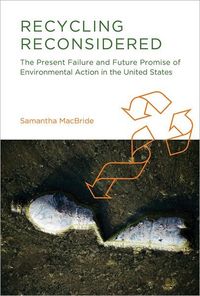

Purchase
The Present Failure and Future Promise of Environmental Action in the United States
MIT Press
December 2011
On Sale: December 9, 2011
312 pages
ISBN: 0262016001
EAN: 9780262016001
Hardcover
Add to Wish List
Non-Fiction
Recycling is widely celebrated as an environmental success
story. The accomplishments of the recycling movement can be
seen in municipal practice, a thriving private recycling
industry, and widespread public support and participation.
In the United States, more people recycle than vote. But, as
Samantha MacBride points out in this book, the goals of
recycling--saving the earth (and trees), conserving
resources, and greening the economy--are still far from
being realized. The vast majority of solid wastes are still
burned or buried. MacBride argues that, since the emergence
of the recycling movement in 1970, manufacturers of products
that end up in waste have successfully prevented the
implementation of more onerous, yet far more effective,
forms of sustainable waste policy. Recycling as we know it
today generates the illusion of progress while allowing
industry to maintain the status quo and place responsibility
on consumers and local government. Most disturbingly, it
does so with the strong support of environmental social
movements that defend recycling even as they grapple with
its shortcomings. MacBride offers a series of case studies
in recycling that pose provocative questions about whether
the current ways we deal with waste are really the best ways
to bring about real sustainability and environmental
justice. MacBride does not aim to debunk or discourage
recycling but to help us think beyond recycling as it is
today. In the name of ecological citizenship, she challenges
us to consider larger problems of solid waste, the global
range of environmental threats, and policy alternatives that
go beyond curbside collection of cans, bottles, and paper.
Comments
No comments posted.
Registered users may leave comments.
Log in or register now!
| 


 © 2003-2024 off-the-edge.net
all rights reserved Privacy Policy
© 2003-2024 off-the-edge.net
all rights reserved Privacy Policy